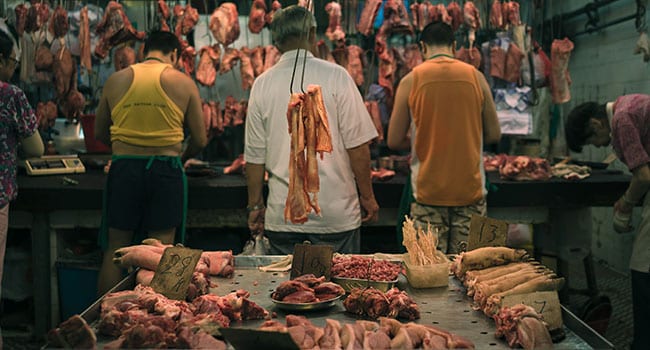 When SARS hit in 2003, China was nowhere near the economic powerhouse it is today. Now, if something happens to China, the entire world is affected and the food sector is not immune. The coronavirus outbreak is proving that.
When SARS hit in 2003, China was nowhere near the economic powerhouse it is today. Now, if something happens to China, the entire world is affected and the food sector is not immune. The coronavirus outbreak is proving that.
Even though the outbreak is starting to slow, the economic damage will easily surpass that of SARS and the effects are being felt in Canada.
China is much more of a consumer-driven economy than in 2003. So China accounts for a much larger share of commodities demand relative to 2003. In recent years, producers of commodities like coffee have been under pressure to supply China. China’s imports have more than tripled in the past decade.
With the emergence of this virus, however, imports have dropped significantly. Most futures market commodities like cattle, hogs and soybeans have dropped anywhere from 10 to 30 per cent in the last few weeks. Shipments for lobsters and other products have all but halted.
This shift may signify cheaper prices in many parts of the world but certainly not in China. China is essentially buying less of everything, making its population more vulnerable. Reports suggest food inflation has exceeded 100 per cent in some areas. Chinese authorities are trying to get food to places where it’s needed but it’s been challenging.
In Canada, prices could drop for products like beef, pork and coffee, depending on how grocers manage margins. But the bargains won’t last.
Observers are still caution that the full economic fallout depends on how well China ultimately contains the outbreak. And when the outbreak is contained, China will be back, buying everything it can.
Considering the new trade truce with the United States, China could be buying American goods at an historical pace. Once this happens, we could see commodity prices soar across the board.
Such a swing could impact prices in Canada. As China gets back to work, we could see yet another major economic shift in the global economy, this time in reverse. Analysts say the futures markets could recover as soon as April or May. If so, food inflation in Canada could be an issue by late spring or early summer.
The big question is how long it will take to contain the outbreak.
We’re seeing encouraging signs. Even as the number of coronavirus deaths in China surpass the toll from SARS, the number of cases reported every day seems to indicate that the situation may be under control.
It’s still too early to succumb to irrational optimism, though, as there is much we still don’t know about the coronavirus. As with SARS, scientists now believe that contact with live animals or slaughtered animals’ flesh may be the cause. Some reports even suggest the spread of the coronavirus may occur through eating meat.
The Coronavirus – 1918 all over again? by Jane Orient
This could be yet another blow to the livestock industry – the last thing it needs now. Activists may use this outbreak to encourage consumers to move away from meat products.
But the reality is that biosecurity measures in China, especially the central part of the country, are questionable at best. China is not known for providing reliable, verified data related to food safety and public health. Perceptions are impacted by what we know and not knowing enough can be particularly problematic.
But the death of Dr. Li Wenliang, whose warnings about the coronavirus were quietened, has made things worse. He has become a potent symbol of the Chinese government’s failure to be transparent.
A similar pattern was seen with SARS in 2003.
And in 2008, thousands of infants were exposed for months to contaminated milk formula, but the government opted to turn a blind eye simply because it was hosting the Olympic Games and didn’t want the distraction. Infant formula tainted with melamine resulted in 54,000 babies being hospitalized and six died. Many of these cases could have been prevented if the government had acted more quickly.
Based on how Li’s disclosure of the coronavirus was handled, nothing has changed.
How China is handling the coronavirus could also indicate how it’s dealing with African swine fever (ASF). Even though ASF is solely an animal disease affecting Asia, concerns are sure to grow. Many believe it could come to Canada soon. There are no associated risks for humans who contract ASF, but Canadian officials could find it difficult to communicate risks when data coming out of China is unreliable.
Before ASF gets to Canada, let’s hope China opts not to suppress any information that can help us contain risks.
Humanity goes through a global outbreak like this every 15 years or so, and given China’s topography and demography, the country could well be the epicentre of many more outbreaks.
The coronavirus just reminds us of how vulnerable we all are.
China’s responsibilities go far beyond its borders, from economic and public health perspectives. This recent lack of transparency is yet another indication that China has not fully matured into its place as a global socio-economic player.
With more economic clout comes more responsibility.
Dr. Sylvain Charlebois is senior director of the agri-food analytics lab and a professor in food distribution and policy at Dalhousie University.
Sylvain is a Troy Media Thought Leader. Why aren’t you?
The views, opinions and positions expressed by columnists and contributors are the author’s alone. They do not inherently or expressly reflect the views, opinions and/or positions of our publication.


